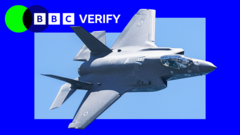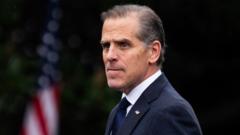As the Gaza war escalates, UK Foreign Secretary David Lammy has voiced outrage at Israel’s military actions, calling on the Israeli government to adjust its approach or face further consequences from Britain. He has expressed dismay over the international community’s inability to halt the ongoing violence and has called attention to the loss of Palestinian lives in aid centers due to Israeli strikes. This renewed scrutiny of the UK's military exports to Israel has sparked calls for a public inquiry into British arms sales and their potential role in the conflict.
UK's Military Support for Israel Under Scrutiny Amid Gaza Conflict

UK's Military Support for Israel Under Scrutiny Amid Gaza Conflict
The UK's involvement in supplying arms to Israel raises questions amid intensifying conflict in Gaza.
The UK is not a primary arms supplier to Israel, with the US leading that charge followed by Germany and Italy. Since 2015, the UK has authorized arms exports to Israel exceeding £500 million ($676.4 million), with a significant focus on components for the F-35 fighter jet, heavily utilized by the Israel Defense Forces (IDF) in strikes on Gaza. Notably, 13-15% of the components for the F-35 originate in the UK. Despite a suspension of various arms export licenses under the current Labour administration due to risks of breaching international law, exemptions remain for F-35 components, prompting concerns from experts about a loophole in arms control.
In recent statements, Lammy has clarified that while military aid remains, it is essential for Israel to defend itself against threats—an assertion that has led to debates regarding the extent of shared military intelligence between the UK and Israel. While some UK drone deployments are reportedly focused on locating hostages, the Royal Air Force (RAF) asserts that no military intelligence is shared directly with the IDF.
Training programs for foreign military personnel, including a limited number of IDF troops, are also part of the UK's defense relationship with Israel, although details remain limited to protect individual identities.
In the political landscape, the UK's stance has shifted following the election of the Labour government, which has become more vocally critical of Israeli actions in Gaza, condemning civilian casualties. Recent sanctions on some Israeli officials highlight this change in approach, yet broader direct sanctions against Israel over its recent actions have yet to be implemented, despite a reported toll of over 59,000 Palestinian lives lost.
As pressures mount both domestically and internationally, the UK faces increased scrutiny regarding its arms dealings and military support for Israel amid the ongoing conflict in Gaza.
In recent statements, Lammy has clarified that while military aid remains, it is essential for Israel to defend itself against threats—an assertion that has led to debates regarding the extent of shared military intelligence between the UK and Israel. While some UK drone deployments are reportedly focused on locating hostages, the Royal Air Force (RAF) asserts that no military intelligence is shared directly with the IDF.
Training programs for foreign military personnel, including a limited number of IDF troops, are also part of the UK's defense relationship with Israel, although details remain limited to protect individual identities.
In the political landscape, the UK's stance has shifted following the election of the Labour government, which has become more vocally critical of Israeli actions in Gaza, condemning civilian casualties. Recent sanctions on some Israeli officials highlight this change in approach, yet broader direct sanctions against Israel over its recent actions have yet to be implemented, despite a reported toll of over 59,000 Palestinian lives lost.
As pressures mount both domestically and internationally, the UK faces increased scrutiny regarding its arms dealings and military support for Israel amid the ongoing conflict in Gaza.





















